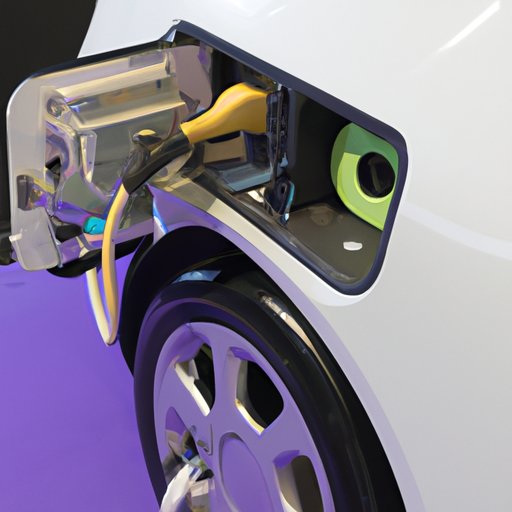Introduction
Electric cars (EVs) are becoming increasingly popular due to their environmental benefits, cost savings, and advanced technology. But what makes an electric car different from other vehicles? How do electric cars work? This article will explore the science and technology behind electric cars, from the types of electric motors that power them to the factors that affect battery capacity and range.

Exploring the Technology Behind Electric Cars
Electric cars use electric motors to power the vehicle instead of internal combustion engines. These motors can be powered by a variety of sources, such as batteries, fuel cells, or even solar energy. There are two main types of electric motors used in electric vehicles: induction motors and brushless DC motors.
Induction motors are the most common type of electric motor used in electric vehicles. They use electromagnetic induction to create rotational motion. This means that when an electric current is applied to the motor, it creates a magnetic field which causes the rotor to spin. The advantage of induction motors is that they are relatively simple and inexpensive to manufacture.
Brushless DC motors are slightly more complex than induction motors and are generally used in high-performance electric vehicles. They use permanent magnets to create torque, which means they require less maintenance and are more efficient than induction motors. Brushless DC motors also provide better acceleration than induction motors.
Electric motors have several advantages over traditional internal combustion engines. They are more efficient, produce fewer emissions, and require less maintenance. Additionally, electric motors are quieter than internal combustion engines, which makes them ideal for urban areas.

The Science of How Electric Cars Operate
Electric cars operate on basic principles of electricity and mechanics. An electric motor converts electrical energy into mechanical energy, which is then used to power the wheels of the car. The electric motor is powered by a battery, which stores energy in chemical form. When the battery is charged, it releases the energy stored in it and sends it to the electric motor, which then converts it into mechanical energy.
Electric cars differ from traditional vehicles in several ways. First, they don’t require gasoline or diesel fuel, so they don’t produce any exhaust emissions. Second, they are much quieter than internal combustion engines, which makes them ideal for urban areas. Finally, electric cars are more efficient than traditional vehicles, meaning they use less energy to travel the same distance.
What Makes an Electric Car Different from Other Vehicles?
Electric cars have several advantages over traditional vehicles. One of the most significant benefits is the environmental impact. Electric cars produce no tailpipe emissions, which helps reduce air pollution and greenhouse gas emissions. Additionally, electric cars are often more fuel-efficient than traditional vehicles, which can lead to significant cost savings.
Electric cars are also much quieter than traditional vehicles, making them ideal for urban areas where noise pollution is a major concern. Additionally, electric cars require less maintenance than traditional vehicles since they don’t need oil changes or other routine maintenance.

Understanding Battery Capacity and Range for Electric Cars
Electric car batteries come in a variety of sizes and capacities. The larger the capacity of the battery, the farther the car can travel on a single charge. However, battery capacity is not the only factor that affects electric car range. Other factors include the weight of the vehicle, driving conditions, and the type of battery.
Lead acid batteries are the oldest and most widely used type of battery for electric cars. They are relatively inexpensive but also have shorter life spans than other types of batteries. Lithium-ion batteries are more expensive but offer longer life spans and higher energy densities. Nickel metal hydride batteries are a good middle-ground between lead acid and lithium-ion batteries.
Examining the Pros and Cons of Owning an Electric Car
Electric cars have many advantages, but there are also some drawbacks to consider. On the plus side, electric cars are more efficient and environmentally friendly than traditional vehicles. They also require less maintenance and can save money on fuel costs. On the other hand, electric cars typically have shorter ranges and higher upfront costs than traditional vehicles.
It’s important to weigh the pros and cons of electric cars before making a purchase. For those who want to reduce their environmental impact and save money on fuel costs, an electric car may be the right choice. For those who need a long range and don’t mind higher upfront costs, a traditional vehicle may be a better option.
Exploring the Future of Electric Vehicle Technology
Electric vehicle technology is constantly evolving, and the future looks bright. Current trends in EV technology include advances in battery technology, improved charging infrastructure, and autonomous driving capabilities. In the near future, we can expect to see longer battery ranges, faster charging times, and increased adoption of electric vehicles.
In the long term, electric cars are expected to become increasingly affordable and efficient. Advances in battery technology will continue to improve range and charging times, while autonomous driving capabilities will make electric cars even safer and more convenient.
Conclusion
Electric cars are becoming increasingly popular due to their environmental benefits, cost savings, and advanced technology. But how exactly do electric cars work? This article explored the science and technology behind electric cars, from the types of electric motors that power them to the factors that affect battery capacity and range. We also looked at the advantages and disadvantages of owning an electric car, as well as current trends in EV technology and predictions for the future.
(Note: Is this article not meeting your expectations? Do you have knowledge or insights to share? Unlock new opportunities and expand your reach by joining our authors team. Click Registration to join us and share your expertise with our readers.)
